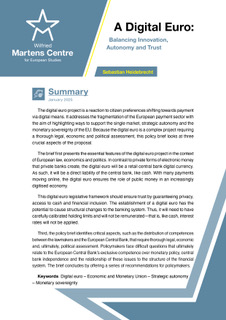Keep calm and keep the budgets on track
12 October 2014
Bond markets are notoriously fickle. They often seem to be driven by sentiment rather than deep analysis. The experience of 2006-2008 shows that they are not infallible. They are not a good guide to long term economic prospects. Rating agencies seem to follow sentiment rather than lead it. They are like a bus driver who is looking out the back window of the bus rather that at the road in front.
This is the context in which France and Italy should be assessing the wisdom of submitting draft budgets this month to the European Commission, in accordance with the Stability and Growth Pact, that go back on commitments they had previously given to reduce their budget deficits to below 3% of GDP.
The low rate of interest at which most European governments can borrow at the moment can be explained by two factors, which are not necessarily permanent:
1. Sovereign bonds, that is bonds issued to allow governments to borrow, are treated as entirely risk free assets in the balance sheets of banks under the rules the EU has set for calculating the solvency and adequacy of capital of banks. This is a somewhat artificial assumption, in that it implies that there is a ZERO risk that a European Government will ever default on its bonds i.e. fail to pay all the interest due and repay the bond in full and on time. The scale of debt relative to income of some European countries might lead some to question this assumption, unless of course there is a big surge in either inflation or economic growth
2. Prevailing interest rates are now so low, the amount of money seeking a home is so great, and high yielding investments are so scarce, that it is not surprising that investors are turning to government bonds, and thus driving down their interest rate. But if the flow of funds slowed, or if the availability alternative better yielding investments were to increase, the demand for government bonds would immediately slow. Then the interest on government bonds would have to increase, if governments were to sustain their borrowing levels.
It is against this background that the budget plans to be submitted by member governments of the euro on 15 October will have to be assessed. The European Commission, in assessing the draft budgets of member states, would be unwise to assume that present low interest rates on government bonds are a permanent condition.
Ironically, while governments may defy the European Commission, they would not be able to defy the bond markets, if, for any reason, bond markets were to change their minds about sovereign bonds, and look for a higher interest rate. Bond markets can be less forgiving and less attentive to rhetoric or political argument
than the European Commission or Ministerial colleagues in the European Council of Ministers.
That could happen quickly, leaving little time for adjustment.
It is less likely to happen if the EU’s system for coordinating the budget policies of the 18 euro area states (the Two Pack and the Six Pack) are seen to be respected, especially by the big countries like France and Italy. This is backed up in a very specific way by Article 126 of the European Treaties.
If the system is defied, or reinterpreted in a way that removes its meaning, the fickle bond markets could get nervous again.
Ireland knows, better than most, how difficult that can be for a state that needs to borrow to fund services, or repay maturing debts.
ENJOYING THIS CONTENT?






















